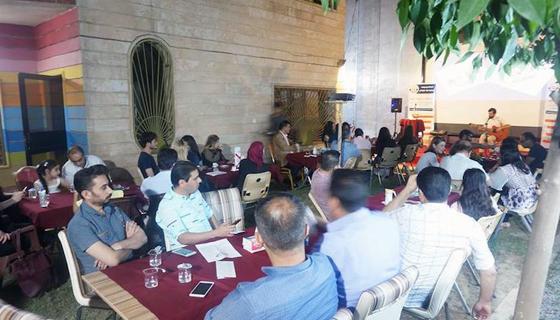On a cool summer night, about 50 men and women gathered at a house yard in the Kurdish capital of Erbil’s traditionally Christian central Ainkawa district to listen to a live saz performance and poetry recital.
The newly-launched Media Culture and Arts Academy organized the event alongside the Al Mada Reading Club to promote its training programs of musical instruments for the young and anyone else interested in taking up a hobby.
Jiwan Mourad, a refugee from the city of Hasaka in Syrian Kurdistan (Rojava), is a private instrument teacher who recently started working for Media after two years of singing at various clubs in Erbil.
Mourad sang songs in different Kurdish dialects and Arabic, after several poets took turns on a humble stage, reading out their works to the audience.
During a break from playing saz, an oriental instrument, Mourad told Kurdistan24 he was giving one on one, private classes for guitar, tamboura, oud, piano, and solfège to those who apply to learn an instrument or improve their vocal skills.
Each student receives one hour a day, three days a week of training for $100 per month, a price 20 percent discounted for the members.
Those who wish to enjoy a feast of local live music can show up every Thursday night at Media, Mourad added.
Media director Shiyar Sheikho, another refugee who hails from Rojava’s western Afrin region, stated his staff plans to hold seminars on arts and literature.
The privately-founded academy, inaugurated only a month ago, is in a partnership with the Kurdistan Region’s Ministry of Culture and Youth.
The academy also gives language classes in Arabic as well as the two main Kurdish dialects of Kurmanji and Sorani.
It issues officially recognized certificates for successful graduates after three months of attendance in music and language classes, Sheikho highlighted.
He predicted the number of participants in the courses he offers would rise with time.
Ehab Ahmad Naser, a Syrian Arab businessman residing in the United Arab Emirates, is Media’s founder and sponsor.
“I have high hopes,” Naser told Kurdistan24. “Inshallah [God willing] in the future it becomes a university.”
The academy’s name, not to be confused with the Latin-rooted English word media, is a popular girl name in Kurdish.
It is also a reference to the ancient Mede people to whom the Kurds among other Iranian peoples trace back ancestry.
As it happens, Naser revealed he named his initiative after his Kurdish wife, Media, from Kirkuk.
“I did so because of her love, and my love for her country, Kurdistan, and the city of Kirkuk,” Naser said.
“I want to invest in and serve this beautiful country,” he continued, also mentioning the economic challenges the finance-stricken region faces.
Media is on the same street with Ainkawa’s well-known Teachers’ Club, a usual gathering place for locals, foreign journalists on assignment, and expatriates residing in the Kurdistan Region.
Kurdistan24
2 July
























































